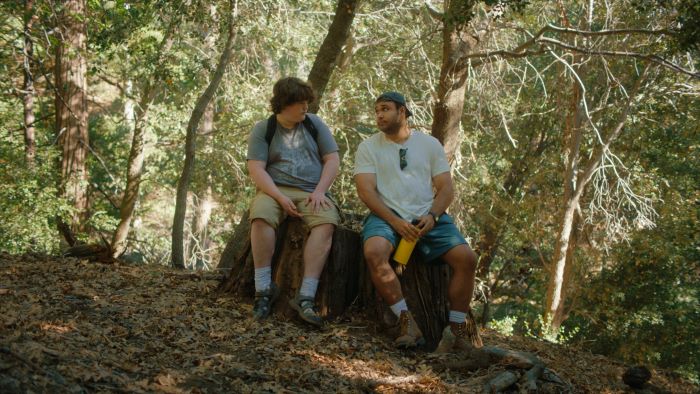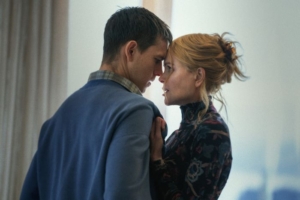In the opening of writer/director Corey Sherman’s Big Boys, floppy-haired, heavyset 14-year-old Jamie (Isaac Krasner) looks out the laundry room window at night with curiosity and fascination at the bearish guy across the street. The guy notices him and nods as he preps charcoal on a grill, and Jamie awkwardly waves back. The neighbor is then joined by another bearish guy, patting him on the back. It’s a fleeting moment, but there is so much longing inferred through the way it’s cut and shot, and especially through Krasner’s performance.
Jamie soon embarks on a camping trip with his surly 16-year-old brother Will (Taj Cross) and his 25-year-old cousin, Allie (Dora Madison), who he adores. Initially, he’s upset when he learns that Allie’s boyfriend Dan (David Johnson III) is joining the outing, breaking up the family-only gathering, but once he meets the attractive, burly, friendly Dan for the first time, he is smitten.
Krasner is excellent at conveying moments of awkwardness with fumbling movements, nervous, long-winding statements, and slight, diverting glances. It’s an endearing, funny turn, as Jamie, a smart, aspiring chef and Barefoot Contessa stan, navigates this intense weekend crush. With his backwards cap and subtle, Southern drawl, Johnson is charming, his Dan lackadaisical and sweetly non-judgmental. Objects of affection in queer films are often golden, well-sculpted gods, so its welcome to see just an affable, regular guy represented.
Shot in the tranquil woods of Lake Arrowhead, California, Sherman’s film is naturalistic and modest, instead of reaching for sky-high moments of conflict and devastating stakes. Its style is straightforward and unpretentious, only reaching out-of-the-ordinary flair when Jamie lays in his sleeping bag in a tent, fantasizing about an older version of himself (Jack de Sanz) alone with a similarly aged Dan (it’s all intimate, but chaste stuff, including clothed shoulder rubs).
In crafting his script and movie, Sherman drew upon his own adolescent and teenage experiences of unrequited crushes. In the press notes, he relays how he “always saw overweight men as the butt of the joke, which subconsciously delivered the message that there is nothing powerful or attractive about them.” What’s refreshing about Big Guys is that it eschews dourness, disparaging its characters, and overanalyzing body issues while achingly tapping into queer realization. It’s probably one of the most cringeworthy and accurate films of adolescence since Bo Burnham’s Eighth Grade.

















Leave A Comment